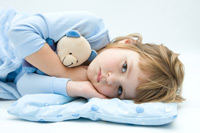Sickness Can Be Stressful
 As a busy parent, when your child becomes sick, your stress level increases. Not only are you concerned about the welfare of your ill child, but you may also have to miss work. While Koala-T-Kare is compassionate about the stress parents face when they need to find alternative care for a sick child, our sick child policies are in place for the safety and protection of all the children in our center.
As a busy parent, when your child becomes sick, your stress level increases. Not only are you concerned about the welfare of your ill child, but you may also have to miss work. While Koala-T-Kare is compassionate about the stress parents face when they need to find alternative care for a sick child, our sick child policies are in place for the safety and protection of all the children in our center.
If a communicable disease has been diagnosed for any child or staff member, it will be immediately posted using an “Exposure Notice.” The name of the person who is sick will be kept confidential. If a communicable disease has been diagnosed, the classroom, including toys, furniture and other equipment of the child, will be cleaned and sanitized with a department-approved disinfectant to prevent the further spread of disease.
Dispensing Medication
Koala-T-Kare will not administer any over the counter medications. These medications are also not allowed in the center. Teachers can administer prescriptions medications when necessary. Medications need to be in their original container, and the prescription label attached. The proper authorization forms will also need to be filled out.
Here are some of the primary reasons children should be excluded from child care and for how long:
- Unexplained Rash- only if other symptoms are present.
- Fever 100.4 degrees or higher – child must be fever-free without medicine for 24 hours. Please note that “fever free” means the child has not been given an over-the-counter pain medication for alleviating symptoms in the last 24 hours. (exception: fever is determined to be from teething)
- Diarrhea 3 or more loose stools in 24 24-hour period OR toilet-trained children: 2 accidents occurred ** Diapered children: 2 loose stools that are not contained in a diaper. Exclude until asymptomatic for 48 hours.
- Vomiting – child may return when free of vomiting for 24 hours.
- Strep Throat – child may return 24 hours after fever breaks and/or 12 hours after first dose of antibiotic.
Conjunctivitis/“Pink Eye”- If child shows behavior change that poses a risk for spreading. IE. Rubbing eyes a lot, staff can’t keep up with the drainage.
Chicken Pox or Hand, Foot and Mouth Disease - 24 hours after all pox/blisters have scabbed over and are not oozing liquid.
Respiratory Illness (includes Viral Croup, COVID, Pneumonia or Bronchitis) – until fever free for 24 hours.
Head Lice- may return after an effective treatment has been done.
- Child is irritable, continuously crying or requires significantly more attention than can be provided without compromising the health and safety of other children in our care.
Three Key Criteria for Exclusion:
Most childhood illnesses do not require exclusion. Caregiver/teacher should determine if the illness:
- Prevents child from participating comfortably in activities
- Results in need for care that is greater than staff can provide without compromising health and safety of other children
- Poses risk of spread.
*If any of these criteria are met, child should be excluded regardless of the type of illness.
It is imperative that parents come to pick up children as soon as possible after notification of an illness, so we can reduce the risk of spreading germs throughout the center and decrease the time of isolation for the child.
